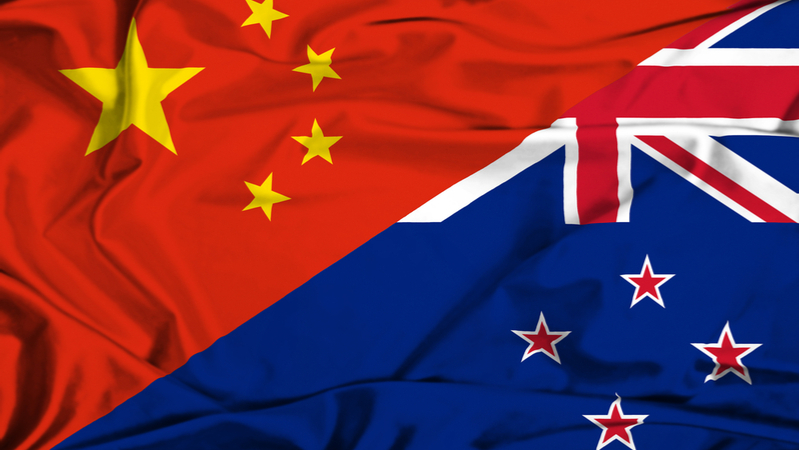New Zealand-China relations: 2017-18
March 19 2018

In a 2015 research report for the Australia-China Relations Institute, former New Zealand High Commissioner in Canberra John Larkindale wrote of the New Zealand-China relationship:[1]
The relationship has never become a topic for partisan political division, though elements of China’s growing presence in New Zealand and aspects of the economic links are increasingly attracting debate, and sometimes controversy.
…New Zealand has managed to build a comprehensive strategic partnership with China based on consistent, pragmatic and proactive policies.
The report was written during the government of then-National Party leader John Key (2008-2016).
On October 26 2017, New Zealand Labour Party leader Jacinda Ardern took office as Prime Minister, with New Zealand First (NZ First) Party leader Winston Peters as Deputy Prime Minister and Foreign Minister.
This fact sheet summarises the Labour-NZ First government’s statements on China.
Diplomatic and trade relations
In his speech for the 45th Anniversary of Diplomatic Relations Symposium in Wellington on December 5 2017, Minister Peters highlighted the comprehensive strategic partnership between the two countries:[2]
Today, the relationship between New Zealand and China is described as a comprehensive strategic partnership and there is plenty of evidence to support that.
Our record of trade and economic ‘firsts’ is dramatic.
At the same time, Minister Peters noted:[3]
New Zealand and China do not always see eye to eye on every issue; we are different countries and New Zealanders are proudly independent. However, China and New Zealand have a close, constructive and increasingly mature relationship. Where we do have different perspectives, we raise these with each other in ways that are cordial, constructive and clear.
New Zealand entered into a free trade agreement (FTA) with China in 2008. In November 2016, then-Prime Minister John Key announced that both countries had agreed to negotiate an upgrade to the FTA. In 2017 there were two rounds of negotiations in April and July respectively.[4] The proposed upgrades were discussed in November 2017 during current Prime Minister Jacinda Ardern’s meeting with Chinese Premier Li Keqiang on the sidelines of the ASEAN Summit in Manila, but no further announcements have been made.[5]
PRC influence in the Pacific
In an address at the Lowy Institute for International Policy in Sydney on March 1 2018, Minister Peters did not explicitly mention China. He did, however, acknowledge the influence of ‘external actors and influences’ and said New Zealand would ‘embark on a new, re-energised Pacific strategy’.[6]
Following the speech, Minister Peters criticised the comment by Australian Minister for the Pacific, Concetta Fierravanti-Wells, that China was building ‘white elephants’ and ‘roads to nowhere’.[7] He said, ‘If you’re going to make a statement then don’t offend both parties – the donor and the recipient. That’s exactly what happened’.[8]
In an interview for current affairs website Newsroom on March 10, Minister Peters said of foreign aid to the Pacific:[9]
I don’t specify countries because if you look at the Pacific over a long period of time, there have been some international interventions from a range of countries that have been seriously unhelpful.
I’ve seen whole governments corrupted, this is past times, by offshore interventions, and that country wasn’t China.
However, he also expressed concern about the quality of China’s aid and infrastructure programs in the Pacific, specifically a trilateral aid project with the Cook Islands and New Zealand. Minister Peters said there were ‘big problems’[10] and ‘serious [quality] testing is going on’.[11]
New Zealand and the Belt and Road Initiative
Also following his Lowy Institute speech on March 1, Minister Peters voiced criticism of the previous administration’s approach to the Belt and Road Initiative:[12]
I do regret the speed with which the previous government signed up. They couldn’t have known with any great depth exactly what it all meant.
…I do not feel that we should be bound because a previous government signed up to something. Let’s face it – we’ve all got belts, we’ve all got roads…so what is actually new here?
He repeated this position in an interview on the television show Q+A on March 4:[13]
[T]he speed with which [the previous government] did it showed a lack of...preparation and thought and consideration as to what it all means.
PRC influence in New Zealand
On September 13 2017 New Zealand current affairs website Newsroom published a report claiming that Chinese-born National Party MP Yang Jian had failed to fully disclose his background as a teacher for a People’s Liberation Army (PLA) Third Department language school, and as a student and instructor at the PLA Air Force Engineering College. The report also claimed Mr Yang had been a member of the Chinese Communist Party (CCP).[14] Mr Yang admitted he had not specifically declared these previous affiliations in his application for New Zealand citizenship.[15]
Mr Yang’s background was also scrutinised in a research report by New Zealand academic Professor Anne-Marie Brady, ‘Magic weapons: China’s political influence activities under Xi Jinping’, published in September 2017 by the Wilson Center’s Kissinger Institute on China and the United States.
Professor Brady’s report, which takes New Zealand as a case study to examine the Chinese government’s foreign influence activities, drew international media attention[16] and was arguably a catalyst for greater public debate within New Zealand about the potential influence of the People’s Republic of China (PRC) on its political affairs. The report argues:[17]
New Zealand’s [sic] needs to face up to some of the political differences and challenges in the New Zealand-China relationship and to investigate the extent and impact of Chinese political influence activities on our democracy…Like Australia, we may also need to pass new legislation which better reflects the heightened scale of foreign influence attempts in our times.
Before becoming Prime Minister, Labour Party leader Jacinda Ardern said Yang Jian’s case did not necessitate stronger security clearances for politicians across the board, and suggested it was a matter for the National Party:[18]
I think it is for each political party to manage their own members and keep a watch on those issues of discipline and appropriate relationships.
Speaking at an election campaign event in Dunedin on September 14 2017, leader of the NZ First Party Winston Peters took a different tone. He reportedly said, ‘The influence of the Government of China is real within the New Zealand government. This is not a spy thriller from the airport bookshelves’.[19]
In a media interview on November 24, Minister for Justice and Minister for Intelligence Services, Andrew Little, said of Yang Jian’s background:[20]
He’s a New Zealand citizen, that entitles him to stand for Parliament. There’s a variety of backgrounds…
I’d be very worried about saying there were criteria beyond citizenship that we should add to about whether you can stand for Parliament.
Regarding debate in Australia over PRC influence, on December 7 The New Zealand Herald quoted Prime Minister Ardern as stating:[21]
When it comes to some of the issues that have been raised in Australia, I haven’t seen evidence of the kinds of issues they are talking about here in New Zealand. That’s not to say we should be complacent. We have to be vigilant and we are.
On December 11 the Financial Times reported that New Zealand’s security chiefs had provided briefings to Prime Minister Ardern and Minister Little, which demonstrated their concern over PRC influence in both New Zealand and Australia. One of these briefings reportedly ‘cites “activities in New Zealand over the past year [that] have included attempts to access sensitive government and private sector information, and attempts to unduly influence expatriate communities"'.[22]
This fact sheet was prepared by Simone van Nieuwenhuizen, Project and Research Officer, Australia-China Relations Institute, University of Technology Sydney.
Sources:
[1] John Larkindale, ‘New Zealand’s China policy: Building a comprehensive strategic partnership’, Australia-China Relations Institute, 2015 , p. 6 <http://www.australiachinarelations.org/sites/default/files/19459%20ACRI%....
[2] Winston Peters, ‘Anniversary of diplomatic relations with China’, speech transcript, December 5 2017 <https://www.beehive.govt.nz/speech/anniversary-diplomatic-relations-china>.
[3] Ibid.
[4] New Zealand Foreign Affairs and Trade, ‘NZ-China FTA upgrade’, 2017 <https://www.mfat.govt.nz/en/trade/free-trade-agreements/free-trade-agree....
[5] Ministry of Foreign Affairs of the People’s Republic of China, ‘Li Keqiang meets with Prime Minister Jacinda Ardern of New Zealand’, November 14 2017 <http://www.fmprc.gov.cn/mfa_eng/zxxx_662805/t1510676.shtml>.
[6] Lowy Institute for International Policy, ‘Winston Peters on New Zealand and the Pacific’, speech transcript, March 1 2018 <https://www.lowyinstitute.org/publications/winston-peters-new-zealand-pa....
[7] Primrose Riordan, ‘Coalition attack on China over Pacific aid’, The Australian, January 10 2018 <https://www.theaustralian.com.au/national-affairs/foreign-affairs/coalit....
[8] Lowy Institute for International Policy, ‘Winston Peters on New Zealand and the Pacific’, audio of Q&A session, March 1 2018 <https://www.lowyinstitute.org/publications/winston-peters-new-zealand-pa....
[9] Sam Sachdeva, ‘Peters talks aid, China and NZ’s global citizenship’, Newsroom, March 10 2018 <https://www.newsroom.co.nz/2018/03/09/95500/peters-talks-aid-china-and-n....
[10] Ibid.
[11] Ibid.
[12] Lowy Institute for International Policy, ‘Winston Peters on New Zealand and the Pacific’, audio of Q&A session, March 1 2018 <https://www.lowyinstitute.org/publications/winston-peters-new-zealand-pa....
[13] TVNZ, ‘Q+A: Winston Peters on China and the Pacific “reset”’, transcript, Scoop, March 4 2018 <http://www.scoop.co.nz/stories/PA1803/S00039/qa-winston-peters-on-china-....
[14] Mark Jennings and Melanie Reid, ‘Newsroom Investigation: National MP trained by Chinese spies’, Newsroom, September 13 2017 <https://www.newsroom.co.nz/@summer-newsroom/2017/09/12/46657/newsroom-in....
[15] Nicholas Jones, ‘National MP didn’t name Chinese military institutes in citizenship application’, New Zealand Morning Herald, September 14 2017 <http://www.nzherald.co.nz/nz/news/article.cfm?c_id=1&objectid=11922025>.
[16] See, for example, James Kynge, Lucy Hornby and Jamil Anderlini, ‘Inside China’s secret ‘magic weapon’ for worldwide influence’, Financial Times, October 26 2017 <https://www.ft.com/content/fb2b3934-b004-11e7-beba-5521c713abf4>; Julia Hollingsworth, ‘Spies and a magic weapon: Why are Australia, NZ so suspicious of China?’, South China Morning Post, September 23 2017 <http://www.scmp.com/week-asia/politics/article/2112473/spies-and-magic-w... Jamie Walker, ‘Bombshell report claims NZ leaders ‘in denial’ over Chinese influence’, The Australian, September 22 2017 <https://www.theaustralian.com.au/news/nation/bombshell-report-claims-nz-....
[17] Anne-Marie Brady, ‘Magic weapons: China’s political influence activities under Xi Jinping’, Woodrow Wilson Center, September 2017, p. 43 <https://www.wilsoncenter.org/sites/default/files/magicweaponsanne-marieb....
[18] Jamie Smyth, ‘NZ opposition taps “Jacindamania” in search of rare poll victory’, Financial Times, September 20 2017 <https://www.ft.com/content/ecab2772-9dab-11e7-8cd4-932067fbf946>.
[19] Dene Mackenzie, ‘NZ under China’s influence: Peters’, Otago Daily Times, September 15 2017 <https://www.ft.com/content/ecab2772-9dab-11e7-8cd4-932067fbf946>.
[20] Shane Cowlishaw, ‘Andrew Little has some big changes in store’, Newsroom, November 24 2017 <https://www.newsroom.co.nz/2017/11/23/62996/andrew-little-has-some-big-c....
[21] Derek Cheng, ‘NZ urged to follow Australia’s crackdown on foreign influence’, New Zealand Morning Herald, December 6 2017.
[22] Jamie Smyth, ‘New Zealand security chiefs warn of China threat’, Financial Times, December 11 2017 <https://www.ft.com/content/4c23258a-de28-11e7-a8a4-0a1e63a52f9c>.

